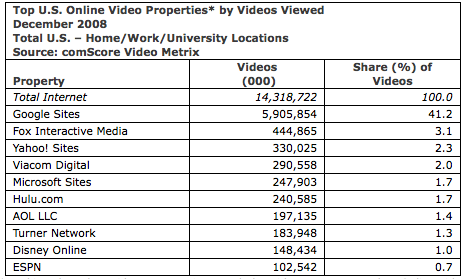Google To Create “Hulu” For Music Video, Moves Toward Inclusion Of More Professional Content On YouTube
YouTube spawned Hulu and Hulu is having a big influence on the future of YouTube. Hulu has had great success with brand advertisers, while YouTube has struggled to sell itself to brands despite being the dominant video site online (see chart below). Accordingly, last month ClickZ reported that YouTube was getting a Hulu-like makeover that […]
YouTube spawned Hulu and Hulu is having a big influence on the future of YouTube. Hulu has had great success with brand advertisers, while YouTube has struggled to sell itself to brands despite being the dominant video site online (see chart below). Accordingly, last month ClickZ reported that YouTube was getting a Hulu-like makeover that would better showcase some of the professionally produced TV and film content YouTube has been working to acquire:
The new design will offer four tabs: Movies, Music, Shows, and Videos. The first three tabs will display premium shows, clips, and movies from Google’s network and studio partners, all of which will be monetized with in-stream advertising. Meanwhile the Videos channel will house amateur and semi-pro content of the sort major brand advertisers have shied away from.
YouTube has also been doing lots of creative things to generate more revenue and live up to expectations in that arena. Among them, expanding the novel “click to buy” program and adopting a version of paid search (“sponsored videos“) for the site. But many financial analysts consider YouTube a disappointment from a revenue standpoint:
Credit Suisse estimates YouTube will manage to rake in about $240 million in ad revenue in 2009, against operating costs of roughly $711 million, leading to a shortfall of just over $470 million. This half-billion dollar loss comes after more than a year of feverish experimentation in various forms of advertising, cross-product embedding, licensing and partnership deals. YouTube is adamant that ultimately they’ll find an advertising solution that will enable the ungainly behemoth to reach profitability. Looking at the math, it doesn’t seem likely.
Against this backdrop comes the redesign and stepped up deals for more professional content to make YouTube “safer” for brand advertisers. YouTube is reportedly in talks with Sony Pictures to include feature films on the site. It already has a limited deal with MGM. More interesting than that is the new joint venture with Universal Music called Vevo, which aspires to be the “Hulu of music video.” According to the NY Times:
Music videos of Universal’s artists will be available both on Vevo.com, which will be powered by YouTube’s technology, and on a Vevo channel on YouTube. The companies said they would share revenue from advertising on both sites, but declined to discuss specific terms of the agreement.
Vevo is being set up as a separate company that is owned by Google and Universal, according to a person familiar with the agreement who requested anonymity because he was not allowed to discuss its terms publicly.
Google and Universal said they planned to introduce Vevo this year. They said they were working to persuade other major labels to join the site.
There will be direct sales of music and, presumably, advertising on Vevo that will be shared by Universal, Google and anyone else who joins. But what’s most interesting to me is the fact that YouTube is the “white label” infrastructure provider in the deal. (YouTube will also get the content.) Advertisers will undoubtedly like Vevo, as they have taken to Hulu.
YouTube is the dominant video destination online:
Source: comScore
Finally, in a related item that has echos of newspaper complaints against Google, successful songwriter Pete Waterman says that he’s been “exploited” by YouTube:
The 62-year-old said the Rick Astley classic Never Gonna Give You Up, which he co-wrote and which was the subject of a YouTube craze last year, had earned him just £11 from Google, despite being viewed 154 million times.
Waterman, whose fortune was estimated at £47 million by The Times in 2004, compared this treatment to the “exploitation” of migrant workers in the Middle East.
Pete probably needs to take that complaint up with the music label — in this case Sony.
Contributing authors are invited to create content for Search Engine Land and are chosen for their expertise and contribution to the search community. Our contributors work under the oversight of the editorial staff and contributions are checked for quality and relevance to our readers. The opinions they express are their own.
Related stories
New on Search Engine Land
